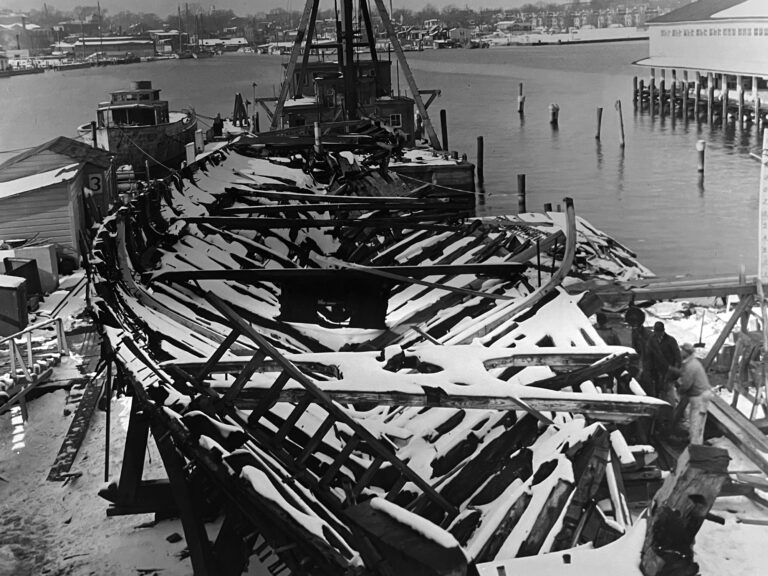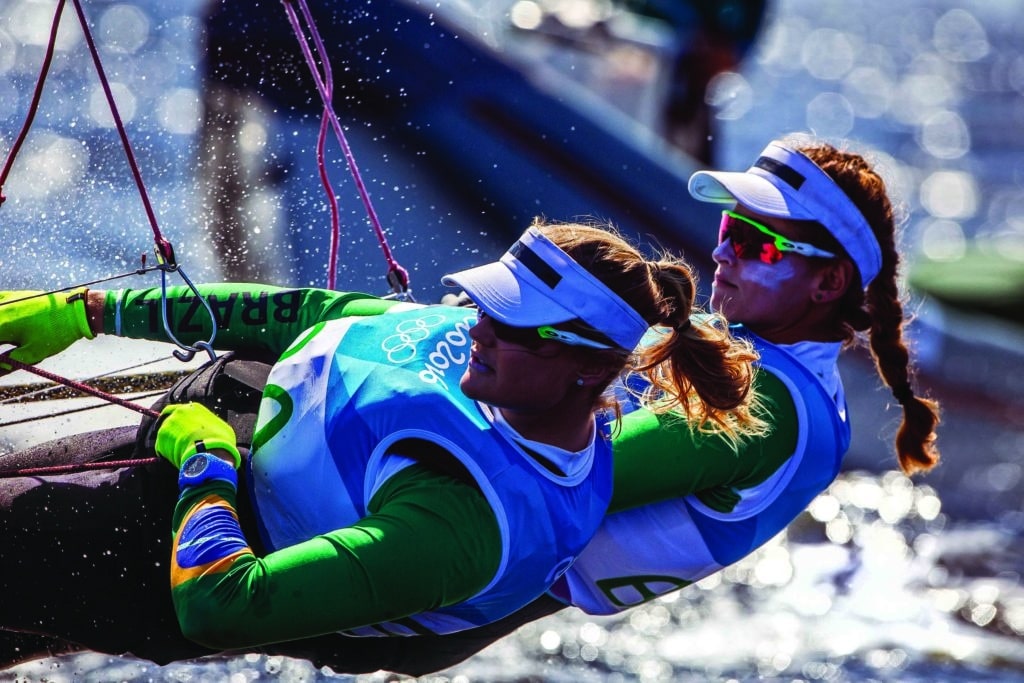
The Rio 2016 Olympic Sailing Competition
Martine Grael, the 25-year-old helm of the Brazilian 49erFX team, and her crew, Kahena Kunze, 25, approach their first Olympic regatta as they always approach regattas: relaxadas. They don’t let the pressure get to them. What they get is gold, and how they earn it is a story for the books.
Let’s go to the final 49erFX race of the Olympic regatta. It’s Brazil’s last chance at a sailing medal at its home Games, and it’s all on Grael and Kunze.
Whether it’s Grael’s famous sailing family watching from the sidelines, the intensity of the new women’s skiff class, or the fact that the top three teams are tied on points, the energy around Guanabara Bay is escalating. The entire media center is fixated on a TV screen, silent in anticipation, and at the spectator beach in the blinding afternoon sun, the crowd is shimmying to samba music and waving flags. The three-lap medal racecourse is 50 yards from shore.
The start horn sounds, and 10 skiffs accelerate off the line in a wave.
Grael and Kunze and New Zealand’s Alex Maloney and Molly Meech are close to each other near the pin, with the Brazilians slightly ahead. They jockey for position on the first beat, but at the mark, Grael and Kunze round first. The New Zealanders split left, pull ahead, and lead into the leeward gate. It’s here that Grael makes her move and goes left while the Kiwis continue to the right, looking up the course.
Watching from Corcovado Mountain, Christ the Redeemer likely gasps at the risky split. Tension mounts as the crowd waits for the Brazilians’ strategy to play out. Grael keeps her cool.
“I could see the middle of the course had bad pressure, so we stayed on our side as long as we could before we had to go back,” she says. “It would have been really bad to cross in that moment.”
In this data-driven regatta, dominated by playbooks — many teams have binders full of course strategies — the Brazilians have their own approach. “I grew up sailing here, but every day I went out on the bay, I pretended I hadn’t sailed there before,” says Grael. “That way, I’m forced to keep my head out of the boat. We always were looking around, always watching and paying attention.”
The gamble pays off, and when the two boats meet again, the Brazilians are 10 seconds ahead.
After rounding, Grael and Kunze wait for the Kiwis to make their move. “The left side of the course was definitely better on the last downwind leg,” says Grael, “but we couldn’t afford to split with them. We had to cover. We burned some time waiting for their decision.”
The playbook tells them to jibe and go to the shoreline to stay with the pressure. Instead, Grael and Kunze watch and wait.
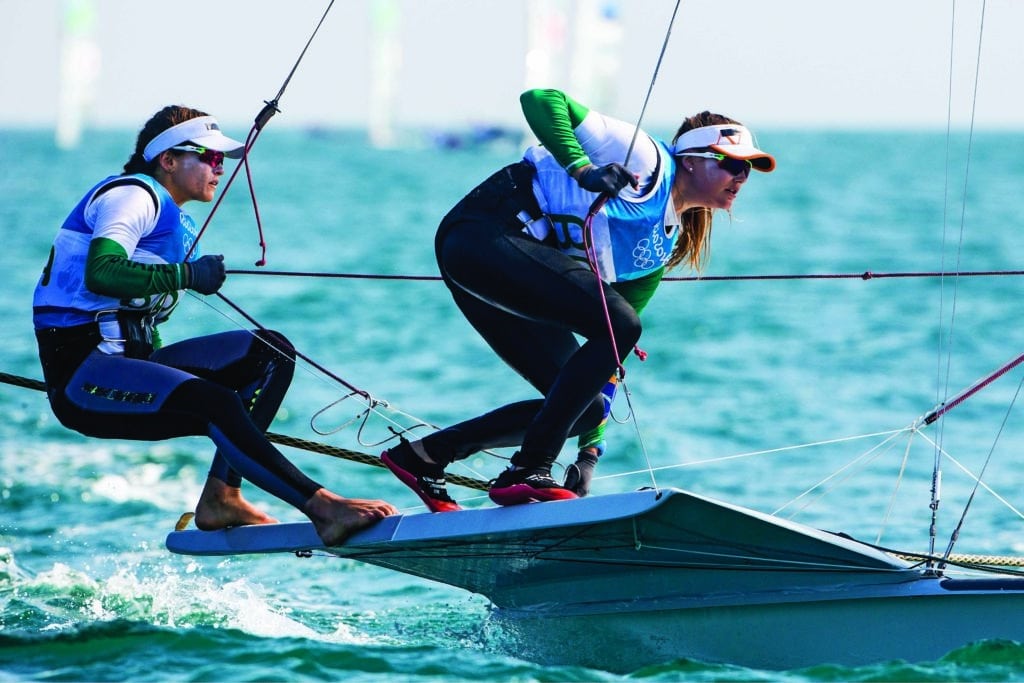
The Rio 2016 Olympic Sailing Competition
The Kiwis round and head right, so Grael and Kunze defend from ahead. “They caught us quite quickly once they got a puff,” says Grael. The race becomes a sprint to the finish, and the Brazilians have the upper hand as the leeward boat. “When we went into the final jibe, we had a lot [of wind],” says Grael. “Then it disappeared, and we found ourselves not making the finish line.”
In this moment, from somewhere behind Sugarloaf Mountain, Rio provides for the hometown team. A gust touches down, surging the Brazilians forward. Ouro.
The delta is a heart-stopping two seconds. Brazil has its sailing medal, and the color is right.
Grael and Kunze capsize their boat in celebration, and the water fills with family and friends. The beach party is at a full roar as the sailors make their way to shore, where spectators hoist the women — boat and all — overhead, carrying them through the venue as royalty.
“It was everything and more than I ever dreamed of,” says Grael. “After the medal ceremony, I could see my parents and my uncle, and they were so emotional. It’s a big thing for our family, winning another medal, because I wasn’t expected to. It was so cool to have them watch me so closely and be there in that moment of such joy.”
Grael’s father, Torben, has five Olympic sailing medals and now coaches the Brazilian sailing team. Her uncle Lars has two bronze medals in the Tornado, and her brother, Marco, sailed in the 49er in Rio, finishing 11th overall. “They told Kahena and I heaps of stories about the Games,” says Grael. “They told us how people make the mistake of treating the Games differently from other championships, how people can burn out before the Olympics.”
Silver medalist Alex Maloney is the one who introduced the women’s skiff to Grael. “I was sailing a 470 at the time, and while training in New Zealand in early 2012, I got a chance to sail a 49er on my day off,” says Grael. “It went terribly, but it was so fun.” Grael and then-teammate Isabel Swan failed to qualify for London in the 470, so Grael turned to the skiff. She got her hands on an FX rig and borrowed her brother’s 49er. “I went out with Kahena, and the sail was love at first sight,” she says. “We did so much better than we could have ever expected in our first days. It was decided, then and there.” Grael and Kunze burst onto the 49erFX scene, finishing second in their first world championship in 2013, then winning the 2014 Sailing World Cup Santander and the Aquece Rio Test Event in 2015.
Past wins pale in comparison to the magic they experience during the medal race. Their win is the signature on-water moment for Rio 2016. So much media attention had been put on water quality and not on the sport itself. Grael and Kunze turn the spotlight firmly in their direction.
The sole Brazilian sailing medal is matched by the young and hopeful US Sailing Team, which departs Rio de Janeiro chins up but almost empty-handed. If not for the valiant medal-race effort of Finn sailor Caleb Paine, Rio would have been a bust — like 2012 — but the team’s clutch guy comes through.
Paine is hardly consistent in Rio, with some impressive comebacks in preliminary races dotted among deep fleet finishes. “I certainly seem to like to make it harder on myself,” he says halfway through the regatta.
He makes his statement when it counts, though, in the medal race where six of the fleet’s 10 sailors are in contention for silver and bronze (Great Britain’s Giles Scott secures gold with a race to spare). The left side of the course is favorable upwind, but Paine sees pressure on the right, goes with his gut, and finds a shift that launches him to the front of the fleet by the first mark — a lead he never relinquishes, crossing the finish line whooping and pumping his fists in bronze-medaled celebration.
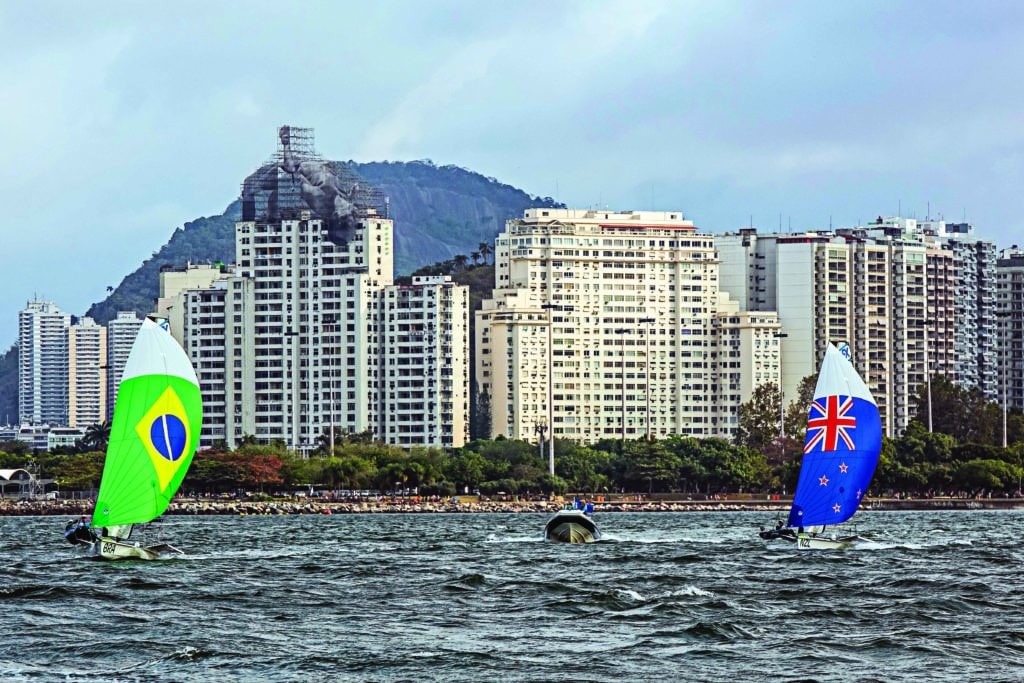
The Rio 2016 Olympic Sailing Competition
It isn’t all bad for the rest of the American squad. Twelve of the US Sailing Team’s 15 athletes, including Paine, are sailing in their first Olympics and advance to six of the 10 medal races. But when it comes to the US Sailing Team’s standouts, where medals could and should be won, there is disappointment.
Annie Haeger and Briana Provancha, the American 470 sure-things, have a shot at silver going into the medal race, with gold already secured by Great Britain’s Hannah Mills and Saskia Clark. In the prerace meeting, Haeger and Provancha meet with coach Dave Ullman to come up with a plan.
“We decided that toward the beach earlier in the race seemed to have lighter air and sheering puffs off the shore, so we thought anyone who sailed on that side would have trouble crossing,” says Haeger. The left side that later in the day would give the Brazilians their skiff victory is the Americans’ downfall. In the lead on the first and second legs, Haeger and Provancha sail away from the beach, expecting the New Zealanders, who have gone slightly right, to have trouble crossing farther up. What they don’t expect is a 20-degree shift.
“All the girls on the inside got that breeze, and we got pinned on the wrong side,” says Haeger. “We then had to hope to make up that distance we lost on the final downwind.” They sail their hearts out on the final leg. It looks for a moment as if they might salvage a bronze, but just before the leeward gate, they foul Ai Kondo Yoshida and Miho Yoshioka, of Japan, and are forced to drop their spinnaker to execute penalty turns. Bye-bye, bronze.
“It’s a difficult pill to swallow,” says Haeger, the wound still fresh in her mind weeks later. “We won as a team and lost as a team, and nothing wavered there. We worked for five years, and it’s crazy that a 20-minute race can dictate whether your campaign was a success or a failure.”
As heart rates return to normal after the intense women’s 470 medal race, the men’s fleet heads out to the same course. The top three teams own the podium, but the medals are still to be determined between the Greek, Croatian and Australian sailors. Out of contention are USA’s Stu McNay and Dave Hughes. Intermittent mistakes have cost them valuable places in the fleet. McNay points to communication breakdowns as their undoing. “There were times [in] this regatta where we supported each other well, and other times where we failed to do that,” says Hughes.
On the Pao racecourse, the race for the men’s 470 medals is on. The three contenders sail one another to the back of the fleet, but Croatia’s Sime Fantela and Igor Marenic maintain the upper hand they’ve held all week, finishing more than 30 seconds in front of silver medalists Mat Belcher and Will Ryan, of Australia. The win for Fantela and Marenic is more than just theirs — they win Croatia its first-ever gold medal in sailing. Silver is nice and bronze is too, but after years of campaigning, training and competition, gold is the true goal, and that’s what fellow Croatian Tonci Stipanovic goes for in the Laser medal race. He is focused on the only sailor who can take that gold away from him, Australia’s Tom Burton.
In the prestart, Stipanovic attacks Burton, sailing in front of him and backing his sail, trapping Burton behind him. The goal: prevent Burton from starting until at least seven boats get ahead. It’s all about piling on the points. Burton is not so easily controlled. Stipanovic errs, leaving space between his boat and the starting line to ensure he isn’t OCS, but he leaves too much.
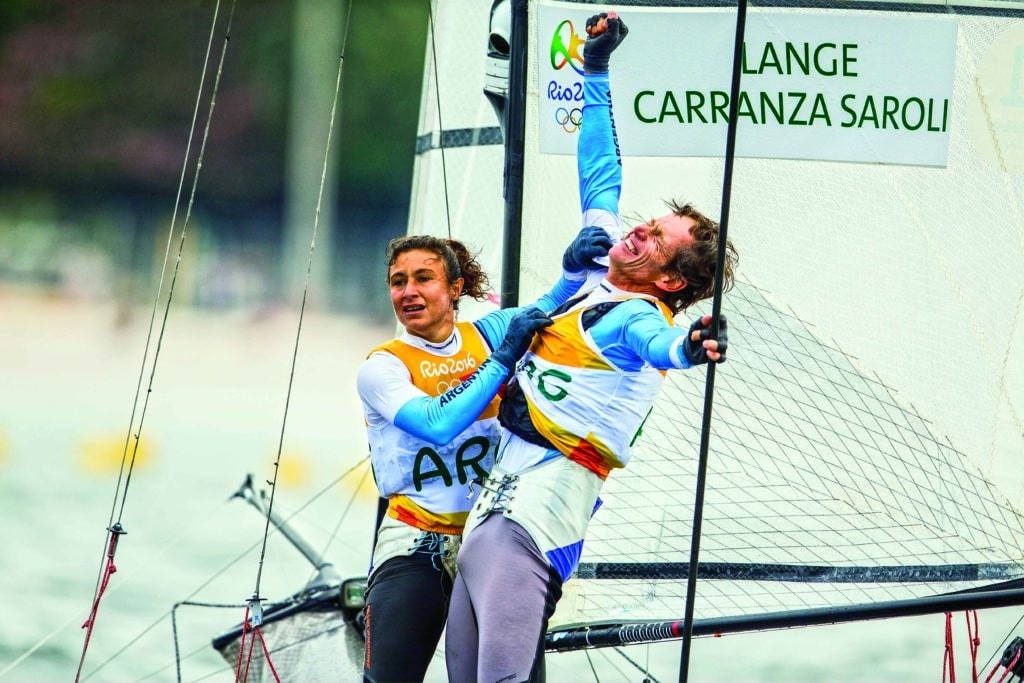
The Rio 2016 Olympic Sailing Competition
The Australian sheets in and sails to leeward of the Croatian. In this split-second maneuver, Burton forces Stipanovic to tack away. The Australian bolts up the first beat, ultimately finishing third to Stipanovic’s ninth, seizing the gold. The women’s Laser Radial medal race is a nail-biter as well. The contenders sail in a dense pack that doesn’t shake out until the last run, when Ireland’s Annalise Murphy takes control. Murphy, who had a medal race go wrong in London, looks as if she might steal the gold from Marit Bouwmeester, of the Netherlands. Bouwmeester, at the start of the run, is deep and fighting to podium at all.
As a tall and heavier sailor, Murphy’s Achilles’ heel is her downwind boatspeed. In the final 100 yards, five sailors pass her, and Bouwmeester is suddenly two places behind her. Murphy finishes fifth to Bouwmeester’s seventh, earning Ireland a silver medal.
Bouwmeester isn’t sure of her status until her coach gives her the thumbs-up. Dutch fans seem unsure as well, until Bouwmeester raises her hands in victory.
Her gold is the second for the Netherlands, whose Dorian van Rijsselberghe wins his second consecutive gold in the men’s RS:X before the medal race.
On the women’s side, Charline Picon, of France, takes home top honors in the RS:X. For the US Sailing Team, the windsurfing classes are both a struggle, with neither Pedro Pascual nor Marion Lepert qualifying for medal races. Rio is also the Olympic debut of the mixed multihull platform, and the Nacra racing does not disappoint. In a high-speed, physical class that favors the young and athletic, it’s 54-year-old Santiago Lange and his crew, Cecilia Carranza Saroli, of Argentina, who win gold. The light-air regatta plays to the tactical strengths of six-time Olympian Lange, who, despite losing half a lung to cancer in 2015, is able to fight his way up in a regatta of chutes and ladders. His personal saga is the feel-good story of the Games, but Lange prefers to focus on the sailing, calling his health scare “just a stone in the road.” Despite two penalties in the final race, Lange and Carranza finish a surprising sixth, with enough points to win gold. Rio serves its share of surprises, from underdog medalists to unpredictable weather, but the 49er gold medal is the only sure thing: Nobody was going to beat the Kiwis, and no one came close. Peter Burling and Blair Tuke top the class with two races to spare and a 43-point margin over silver medalists Nathan Outteridge and Iain Jensen, of Australia.
With only one known sailor, Belgium’s Evi van Acker, falling sick, the concern about infection and illness — from water or Zika — in the end does little to mar an otherwise successful regatta. Rio’s Guanabara Bay fulfills its duties as the most challenging sailing venue in recent memory. Playbooks that are helpful one day are irrelevant the next, and with ever-changing conditions, the sailors who take home hardware are the most well-rounded in their classes.
As quickly as it begins, the Olympic regatta ends in a flurry of container packing and press appearances for the medalists. As the sailors and their support teams board planes bound for faraway places, they each have their sights set on something: the next project, the next regatta or even the next Olympics. Tokyo 2020 is a long four years away, but training is already underway.
Ordem e progresso.





